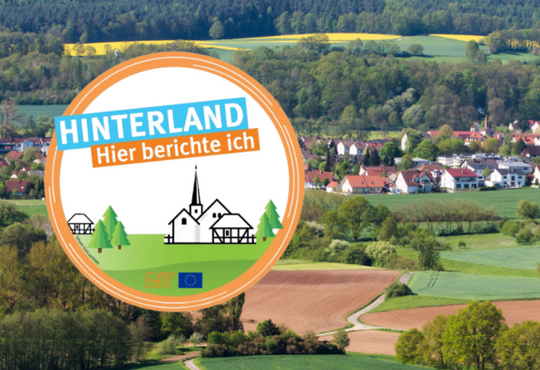Journalism in the “Hinterland” – the Future of Local Reporting

Local journalism is in a dire situation. To address the problem, the Journalists’ Union of Germany (DJV) has launched a project with the aim to revive local journalists. The project highlights the important role of reporting exactly where people don’t expect (but journalists truly find) the biggest headlines: in the province. Far from big media metropolises, in small towns, communities or villages, the so-called “Hinterland”.
An increasing migration to the cities, financing difficulties that often end in fusion and not to forget the adaption of modern working techniques and consumption patterns, are problems which most local journalists are familiar with. In this series of events, case studies by journalists and media professionals themselves are being highlighted and discussed to take the first few steps towards answering one of the main questions in local journalism: What can good journalism in the “Hinterland” look like in the future?
Using the digital while preserving tradition
At one of the events, a freelance journalist pointed out the digital revolution that made it possible for freelancers to connect to other freelancers in provinces, plan projects and – of course – also work online with the metropolis. Digital revolution in form of the digitalisation of newspapers turned out to be a topic that local journalists have divided opinions about.
“The future is online, paper newspapers will be gone in a few years. Television has not replaced newspapers because both have linear formats, but online is a game changer with its constant updates and availability”, said one participant categorically.
A point of view that some other participants did not share, as they don’t want to miss the possibility of holding a paper newspaper in their hands every morning. Local journalism stands for adaptability, but for many, it is also about tradition.
Public media has financial advantages
A local journalist reported on the problems that the pandemic has caused for local portals when it comes to retaining advertising customers. Another freelance journalist who has to manage his work without state aid said that he specialized on places where his colleagues can’t go, “I fill this niche.” Because of the long distances, he has to connect appointments. One topic for several newspapers.
It’s a bit easier for journalists working for public media:
“We make the program for everyone. My parents also want to hear brass band music, but we broadcast Sorbian rap for the younger ones. All groups must be considered”, said a journalist working for the MDR that is financed by contributions.
In view of the economic problems of small regional publishers, a state government representative commented that it was not the task of politics to promote the media directly, but that it was the private sector that had to develop their businesses. Organisations and trade unions can provide support here: not only to mobilize groups and enforce demands, but also to have support guaranteed in case of an emergency situation, even financially.
Media province or media desert?
Disappearing media outlets were another big topic of this series of events. Frank Sonnenberg, freelance photojournalist and active member of the DJV North Rhine-Westphalia, reported on the local challenges as there is hardly any media covering the region Bergisches Land. A typical or evolving “media desert”? Media professionals questioned what “media desert” actually means and discussed several solutions. Local media must be regarded depending on the economic strength of the region they are reporting in. They are called news or media deserts when there is no strong economic background. At the same time, excellent local media exists in those areas, where the economy thrives. Permanent grants and tax advantages might help founding new media on the local level.
Michael Hirschler, speaker at DJV, concludes: “it might make sense to raise sensibility to the meaning of reporting for democracy and create legal obligations to provide fair and open reporting to citizens on the local level.” There should be the right to sufficient reporting about the neighbourhood one lives in. Hirschler questions:
“Why would we accept a town without reporting, when we would not accept a town without an ambulance or police?”
These have been the first steps towards becoming aware of the hurdles of local journalism – as a journalist or a Trade Union – in order to formulate demands and plan further support that will start right here.
This series to promote local journalism included the following events:
- 2nd of March 2022: “Journalismus in the hinterland“ (digital Kick-off-Workshop)
- 31st of May + 1st of June 2022: “Silent days in clichés? Opportunities and risks in hinterland journalism” (Presence theme days)
- 14th of June 2022: “How to form successful freelance teams” (Training via zoom)
- 27th of June 2022: “Media desert?! How journalism can succeed in the hinterland” (Presence One-Day-Safari)
New events are being planned and will be promotedhere.
This project receive the funding from the European Commission through the joint project “Trade Union for a Fair Recovery” launched by the European Federation of Journalists (EFJ) and the European Trade Union Confederation (ETUC).






